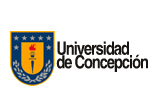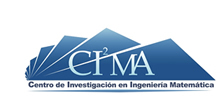Graduate Thesis of Mario Álvarez
 | Program | PhD in Applied Sciences with mention in Mathematical Engineering, Universidad de Concepción |
|---|---|---|
| Enrollment Year | 2013 | |
| Senior Year | 2016 | |
| Thesis Title | Mixed Finite Element Methods For Coupled Problems In Fluid Mechanics | |
Thesis Summary:The main goal of this dissertation is to develop and to apply diverse mathematical and numerical techniques, based on mixed finite element methods and fixed-point strategies, in order to establish the solvability of coupled problems arising in the context of fluid mechanics and that are frequently found in transport processes through viscous flows in porous media. We firstly derive an augmented mixed–primal finite element method for a viscous flow–transport problem. The model consists in the coupling of a scalar nonlinear convection–diffusion equation with the Stokes problem (written in terms of Cauchy pseudostress) where the viscosity depends on the distribution of the solution to the transport equation, which in turn, exhibits a diffusivity term depending on the gradient norm of that solution. One of the main difficulties to obtain numerical approximations of such a coupling is due to the nonlinearities present in the field equations. A novel result in this work is the derivation of a variational formulation for this system by introducing an augmented mixed approach for the fluid flow coupled with a primal method for the transport equation. The solvability of such formulation is stated by combining fixed point arguments and suitable estimates arising from the connection between certain regularity assumptions, and the Sobolev embedding and RellichKondrachov compactness theorems. As a consequence, the existence of solution of the continuous and discrete schemes is obtained by applying the classical Schauder and Brouwer fixed point theorems, respectively. For the corresponding Galerkin scheme we make use of Raviart-Thomas spaces of order k for the Cauchy pseudostress computation, and continuous piecewise polynomials of degree ≤ k + 1 for both velocity and the scalar field. Afterwards, under the assumption of sufficiently small data and employing suitable Strang-type estimates, we provide optimal a priori error bounds. Secondly, we derive two different efficient and reliable residual-based a posteriori error estimators for the associated Galerkin scheme. Our analysis of reliability of the proposed estimators is mainly based on the use of suitable ellipticity and inf-sup conditions together with a Helmholtz decomposition, and the local approximation properties of the Clément interpolant and Raviart-Thomas operator. On the other hand, the main tools employed to show their efficiency include suitable inverse inequalities and the localization technique based on triangle-bubble and edge-bubble functions. Next, the aforementioned methodology is extended to establish the a priori and a posteriori error analysis of a mixed–primal finite element method for a sedimentation-consolidation system, where the flow patterns are governed by the Brinkman equations with variable viscosity and the diffusion coefficient in the transport equation depends only on the concentration. As a consequence, we derive optimal a priori error estimates for the associated Galerkin scheme, together with two efficient and reliable residual-based a posteriori error estimators, which constitutes one of the main contributions of this work. Here the Cauchy pseudostress is approximated by Raviart-Thomas spaces of order k, whereas the velocity and concentration are computed by using continuous piecewise polynomials of degree ≤ k + 1. Finally, we close by providing a vorticity-based fully-mixed finite element method to numerically approximate the flow patterns of a viscous fluid within a highly permeable medium, described by Brinkman equations (written in terms of vorticity, velocity and pressure), and its interaction with classical porous media flow governed by Darcy’s law. The two domains are separated by an essentially fixed interface, across which the flow passes from viscous to a non-viscous regime. In turn, suitable boundary and transmission conditions on velocities, pressures and the vorticity are considered. In this work we introduce a mixed variational formulation which leads to the incorporation of a Lagrange multiplier enforcing the pressure continuity across the interface. Then, the classical Babuška-Brezzi theory is applied in such a way that the continuous inf-sup conditions of the main bilinear form are obtained by employing the so-called T-coercivity approach, which allows us to guarantee the wellposedness of the continuous formulation. Next, we adapt the aforementioned arguments to the discrete case and show that, under suitable assumptions on the discrete subspaces involved, the corresponding Galerkin scheme is well-posed. Here we use a finite element family for which the curl of the subspace approximating the vorticity must be contained in the space where the discrete velocity of the fluid lives, and hence Raviart-Thomas and Nédélec finite elements for velocities and vorticity, respectively, become feasible choices. In turn, the pressures and the Lagrange multiplier are approximated, respectively, by discontinuous and continuous piecewise polynomials. Later, we modify the mixed formulation by incorporating a residual-type term arising from the Brinkman momentum equation, and show that the resulting augmented scheme yields a strongly elliptic global bilinear form, without requiring the aforementioned constraint on the discrete space approximating the vorticity. Whereby any finite element subspace of continuous product space can be applied. For all situations described above we provide several numerical experiments illustrating the satisfactory performance of the proposed methods, and confirming the theoretical results such as the orders of convergence as well as the reliability and efficiency of the proposed a posteriori error estimators. These examples also serve to gain insight about the behavior of the underlying physical phenomena of interest. | ||
| Thesis Director(s) | Gabriel N. Gatica, Ricardo Ruiz-Baier | |
| Thesis Project Approval Date | 2014, August 21 | |
| Thesis Defense Date | 2016, December 16 | |
| Professional Monitoring | Assistant Professor, Universidad de Costa Rica (UCR), Sede de Occidente (S.O), from January 2016. | |
| PDF Thesis | Download Thesis PDF  | |
ISI Publications from the ThesisMario ÁLVAREZ, Gabriel N. GATICA, Ricardo RUIZ-BAIER: A mixed-primal finite element method for the coupling of Brinkman-Darcy flow and nonlinear transport. IMA Journal of Numerical Analysis, vol. 41, 1, pp. 381-411, (2021). Mario ÁLVAREZ, Gabriel N. GATICA, Ricardo RUIZ-BAIER: A posteriori error estimation for an augmented mixed-primal method applied to sedimentation-consolidation systems. Journal of Computational Physics, vol. 367, pp. 322-346, (2018). Mario ÁLVAREZ, Gabriel N. GATICA, Ricardo RUIZ-BAIER: A posteriori error analysis of a fully-mixed formulation for the Brinkman-Darcy problem. Calcolo, vol. 54, 4, pp. 1491-1519, (2017). Mario ÁLVAREZ, Gabriel N. GATICA, Ricardo RUIZ-BAIER: A posteriori error analysis for a viscous flow-transport problem. ESAIM: Mathematical Modelling and Numerical Analysis, vol. 50, 6, pp. 1789-1816, (2016). Mario ÁLVAREZ, Gabriel N. GATICA, Ricardo RUIZ-BAIER: A vorticity-based fully-mixed formulation for the 3D Brinkman-Darcy problem. Computer Methods in Applied Mechanics and Engineering, vol. 307, pp. 68-95, (2016). Mario ÁLVAREZ, Gabriel N. GATICA, Ricardo RUIZ-BAIER: A mixed-primal finite element approximation of a steady sedimentation-consolidation system. Mathematical Models and Methods in Applied Sciences, vol. 26, 5, pp. 867-900, (2016). Mario ÁLVAREZ, Gabriel N. GATICA, Ricardo RUIZ-BAIER: An augmented mixed-primal finite element method for a coupled flow-transport problem. ESAIM: Mathematical Modelling and Numerical Analysis, vol. 49, 5, pp. 1399-1427, (2015). |
||
<< Back to list of Graduate Thesis.

